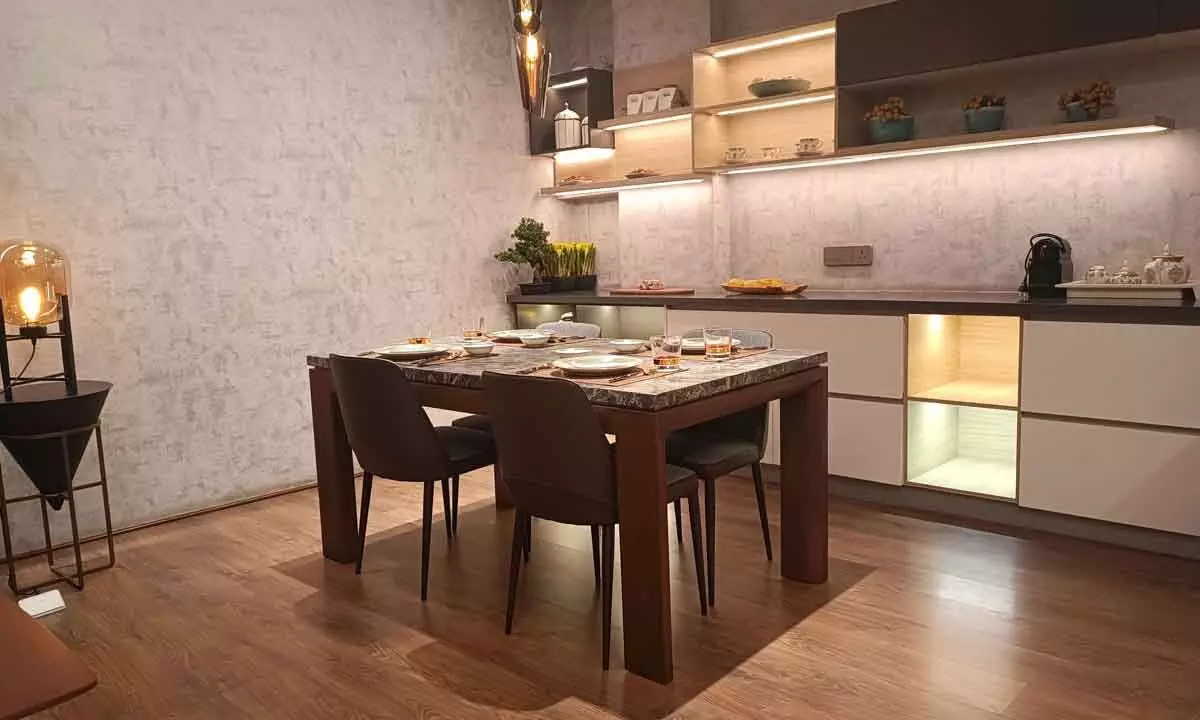Hyderabad startups upbeat on smart home growth as premium automation gains pace
Luxury automation has made its way into the aesthetics of homes and lifestyle of home-owners, from the affluent business class, to celebrities, from successful startup founders to NRIs of Hyd
image for illustrative purpose

In tech-friendly Hyderabad, there is demand for both luxury automation and mid-level smart homes, as a mix of techies and business owners live in the city - Arun Cheela, CEO, Pert Infoconsulting Pvt Ltd
Well, it’s a weekend and the weather calls for a movie and a bowl of popcorn, but no one is in the mood of driving all the way to a theatre. Home theatre systems come to the rescue, indeed. But, to enjoy the movie to its fullest, how does one recreate the effect of a theatre at home, in a click? Solution to create the perfect ambience is brought by home-grown startups working on home automation. Premium smart homes come with features such as control of lights, and curtains to create a specific scene along with aesthetics, while energy efficient and secure smart homes involves control of switches, appliances, entertainment systems, air conditioners, and security systems.
Based on a market researchers report, the smart home market in India is likely to grow to Rs 324.14 billion by 2024, from Rs 90.15 billion in 2019, advancing at a compound annual growth rate of 29.17 per cent. Voice-activated assistants like Alexa, Bixby, Google Home and Siri are being widely used as controlling units in the Indian smart home ecosystem.
Speaking to Bizz Buzz, Arun Cheela, Founder and CEO of Hyderabad-based Pert Infoconsulting Pvt Ltd, said: “In technology friendly Hyderabad, we witness demand for luxury automation and mid-level, as a combination of techies and business owners reside in this city. Residential properties worth over Rs 7 crore opt for luxury automation, while the others with properties valued above Rs 1 crore opt for energy efficient smart homes. Mostly men in the age group of 30-40 years prefer automation while women look for aesthetics. People spend almost 10 per cent of their property value on home interiors out of which five to 10 per cent is allocated on automation. My Rs 1 crore customer will not spend more than Rs 30,000 to Rs 50,000 on home automation.”
Lighting and curtain control are in demand under premium, while energy efficiency and security, are sought by value for money customers. Automation of each curtain costs around Rs 30,000, for a double height curtain it is Rs 75,000 to 80,000. Here, ambience can be set through a remote or a timer, for creating a scene.
Addressing a gap created by European brands in around 2016, city-based Keus Automation Private Limited entered the smart home automation market to provide solutions tailored for Indian homes along with the needed support system. “The smart home automation market was segregated as an industry wherein the companies were developing only devices compatible with certain systems and also there were European brands that were trying to sell to high-net-worth individuals. It took us three years to design devices and set up an overall service for premium clients. We have served more than 900 homes in Hyderabad and are witnessing 15 per cent growth year-on-year. A very basic automation starts from Rs 5 lakh,” Vishesh Jeswani, AGM, Marketing and Branding, said.
The home automation market is categorised into three levels, that is, luxury, mid-level, and DIY. Under the DIY category, customers look for a solution to a particular problem. The next is mid-level where people want wireless automation for the complete home, which includes switches, curtains, door lock, and networking among others. Third is the luxury automation, under which, the customer wants the lighting of the house to be controlled, along with the presence of aesthetics. The price for these starts from Rs 1,000 and goes up to Rs 25 lakh. On the challenges faced by startups operating in this sector, Cheela said, “The challenges we face is that people are not aware that such technology is available and secondly, that homes can be automated at as low as Rs 1,000. So, education and creating awareness about home automation is needed to further this markets growth.”
While the growth of mid-level category of automation is hindered by awareness, the premium clients are educated on smart homes by their architects, interior designers and peer group. “We have witnessed organic growth through word of mouth. Also, through our network of architects and internal networking we are able to garner business. Our clients are majorly business owners, celebrities, founders of successful startups and NRI’s used to a certain lifestyle abroad. As the population of India moves into the upper middle class and HNI bracket, the smart home automation market is likely to grow further,” Jeswani points out.
During Covid, home owners ended up spending more time inside their spaces. This led them to look at automation as a mandatory feature. Moreover, property developers have also started promoting smart homes as an offering to their clients. Based on these factors, homegrown startups are foreseeing an uptick in business with home automation becoming mainstream in the next three to five years.

